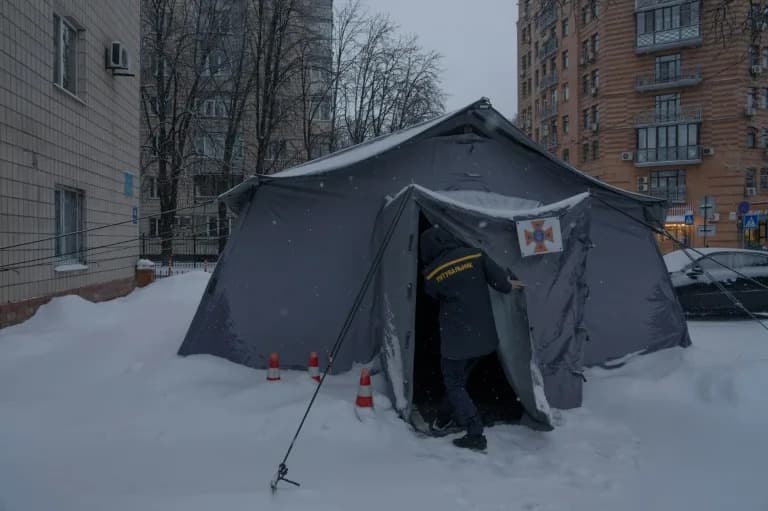Quick summary: Russian strikes on Ukraine’s energy network have left millions facing extended blackouts and cold, with Kyiv scheduled for 10–12 hour outages. Energy minister Svitlana Grynchuk called the assault one of the largest direct ballistic attacks on power facilities since the war began. At least 15 civilians were killed over the weekend, including three in a Dnipro apartment strike; Ukraine reported 45 missiles and about 450 drones were launched. Kyiv says it urgently needs more air‑defence systems while managing severe damage to power and gas infrastructure.
Millions of Ukrainians Plunge Into Darkness After One of Russia’s Largest Strikes on Energy Infrastructure

Millions face cold and blackouts after massive Russian strikes on energy network
Millions of Ukrainians are enduring long power cuts and plunging temperatures after a wave of Russian strikes severely damaged power facilities across the country. Authorities warned that the scale of the damage means repairs will take time and electricity will be rationed while the transmission network is stabilised.
Energy company schedules showed residents of Kyiv were set to face 10–12 hours without power on Sunday as the system copes with rolling cuts. Svitlana Grynchuk, Ukraine’s energy minister, described the attack as “one of the largest direct ballistic attacks on energy facilities” since the war began. Emergency outages were introduced across almost all regions, then changed to hourly rotations so households could better plan around interruptions.
The strikes came as temperatures began to drop into single digits Celsius, increasing the humanitarian urgency. Russia has repeatedly targeted Ukraine’s energy infrastructure since launching its full-scale invasion in 2022, frequently intensifying attacks as winter approaches.
Frequent blackouts have forced many Ukrainians to adapt: diesel generators are now common, families schedule cooking and homework around outage timetables, and elderly residents often avoid leaving buildings for fear of being stranded without working lifts.
President Volodymyr Zelensky said nine regions were struck overnight into Saturday. Local officials reported at least 15 civilian deaths over the weekend. In the central city of Dnipro a drone strike hit a nine‑storey apartment building, killing three people and injuring 12; video captured the impact in darkness. Residents described shrapnel tearing into living spaces and the panic as people fled downstairs.
The Ukrainian air force said Russia fired 45 missiles overnight, some ballistic, and launched about 450 drones; only nine missiles were intercepted. The military reported that 26 missiles and 52 strike UAVs (drones) hit 25 locations, with many strikes concentrated in the central regions of Poltava and Dnipropetrovsk and around Kyiv.
“It is extremely difficult to counter ballistic and aero‑ballistic missiles,” Zelensky said, noting that only a few systems in the world can intercept such weapons reliably and that Ukraine needs many more systems and interceptors to protect its territory.
Kyiv is working with the United States to acquire additional Patriot air‑defence systems, which have proven effective against some Russian missile types. Ukraine has also asked allies for more air‑defence ammunition and for longer‑range strike weapons to target Russian energy and military infrastructure; a recent request for long‑range Tomahawk missiles was reportedly declined by the US last month.
Moscow’s defence ministry said the strikes were reprisals for Ukrainian attacks and that they included Kinzhal ballistic missiles and other munitions aimed at “enterprises of the Ukrainian military‑industrial complex and gas and energy facilities of Ukraine that supported their operations.”
Repeated strikes have damaged Ukraine’s gas production, forcing officials to plan costly European imports to cover shortfalls. Despite the damage, Energy Minister Grynchuk vowed: “Despite the enemy’s plans, Ukraine will have light and heat this winter.”
Ukrainian forces and security services have stepped up drone and missile attacks on Russian refineries, pipelines and pumping stations in recent months. On the same weekend, Ukrainian drones reportedly struck energy targets in the Volgograd region; regional authorities said a substation was hit and power was restored several hours later.
Humanitarian impact: The rolling outages and damaged energy infrastructure are straining homes, hospitals and public services as temperatures fall. Aid groups and local authorities are coordinating emergency measures, but officials warn that restoration and winter preparedness will require international support and time.
Help us improve.


































